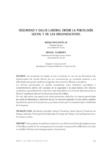Mostrar o rexistro simple do ítem
Seguridad y salud laboral desde la psicología social y de las organizaciones
| dc.contributor.author | Reig-Botella, Adela | es_ES |
| dc.contributor.author | Clemente, Miguel | es_ES |
| dc.date.accessioned | 2013-09-26T10:03:25Z | |
| dc.date.available | 2013-09-26T10:03:25Z | |
| dc.date.issued | 2011 | es_ES |
| dc.identifier.citation | Anuario da Facultade de Dereito da Universidade da Coruña, 2011, 15: 317-330. ISSN: 1138-039X | es_ES |
| dc.identifier.issn | 1138-039X | es_ES |
| dc.identifier.uri | http://hdl.handle.net/2183/10381 | |
| dc.description.abstract | [Resumen] Los accidentes de trabajo se han convertido en uno de los fenómenos más disfuncionales del mundo laboral, por sus consecuencias, su constante aumento y sus dificultades para poder establecer programas de prevención eficaces y duraderos. Los factores psicosociales no pueden considerarse como elementos secundarios o complementarios dentro del concepto de la seguridad y la salud laboral. Son factores sustantivos y, probablemente, cada vez lo sean más debido a la creciente importancia de los factores organizacionales en la estructura actual del trabajo. Por otro lado, existe una ausencia de cultura preventiva, atribuible a la creencia generalizada por parte de empresarios y directivos de que los recursos asignados en este campo suponen desembolsos ajenos al fin productivo y, por tanto, disminuyen la competitividad y rentabilidad de la empresa. | |
| dc.description.abstract | [Abstract] The accidents of work have turned into one of the most disfunctional phenomena of the labour world, for his consequences, his constant increase and his difficulties to be able to establish effective and lasting programs of prevention. Psychosocial factors cannot be considered to be secondary or complementary security and occupational health, are sustantive factors and, probably increasing as more due to the importance of the organizational factors in the current structure of work. There exists an absence of preventive culture, attributable to the belief generalized on the part of businessmen and executives of whom the resources assigned in this field suppose disbursements foreign to the productive purpose and, therefore, they diminish the competitiveness and profitability of the company. | |
| dc.language.iso | spa | es_ES |
| dc.publisher | Universidade da Coruña | es_ES |
| dc.subject | Accidentes laborales | es_ES |
| dc.subject | Cultura preventiva | es_ES |
| dc.subject | Salud laboral | es_ES |
| dc.subject | Prevención de riesgos laborales | es_ES |
| dc.subject | Psicología social aplicada | es_ES |
| dc.subject | Psicología jurídica | es_ES |
| dc.subject | Work accidents | es_ES |
| dc.subject | Preventive culture | es_ES |
| dc.subject | Labour health | es_ES |
| dc.subject | Accident prevention | es_ES |
| dc.subject | Applied social psychology | es_ES |
| dc.subject | Legal psychology | es_ES |
| dc.title | Seguridad y salud laboral desde la psicología social y de las organizaciones | es_ES |
| dc.type | journal article | es_ES |
| dc.rights.accessRights | open access | es_ES |






